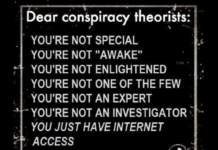
5: Climate Skeptics Are Half-Right, and 100 Percent Full of Shit
There are climate debates worth having, but arguments for skepticism are often willfully ignorant.
If you view the op-ed pages of the New York Times as someplace to float test balloons for crazy thoughts—kinda like the president’s Twitter account—then the debut column from Bret Stephens, the paper’s newest conservative writer, is a home run. His attempt to shake up the notion of scientific certainty about climate change caused some scientists to call for a boycott of the paper, and many readers canceled their subscriptions over it. The right-wing internet, meanwhile, insisted the libs are just being dumb and triggered once again, which gave more fuel to ongoing fights about echo chambers and freedom of opinion.
If it’s really the “newspaper of record,” it is the Times’s job to print conservative voices, and Stephens isn’t wrong about everything (which I’ll get to in a second). But his column isn’t just a bad piece, but a lousy cover version of a very old argument against science that needs to die: The Plea for Humility to Prevail Over the Arrogance of Scientism.
Vice News
4: Hamas accepts Palestinian state with 1967 borders
Hamas has presented a new political document that accepts the formation of a Palestinian state along the 1967 borders, without recognising the statehood of Israel, and says that the conflict in Palestine is not a religious one.
The positions were made official on Monday in Qatar’s capital, Doha, by Khaled Meshaal, the leader-in-exile of the Palestinian group that runs the besieged Gaza Strip.
“We shall not waive an inch of the Palestinian home soil, no matter what the recent pressures are and no matter how long the occupation,” Meshaal told reporters as he revealed the document to the public after two years of work.
“Hamas rejects any idea except liberating the home soil entirely and completely, although it does not necessarily mean we recognise the Zionist entity or give up any of our Palestinian rights.”
While Hamas’ 1988 founding charter called for the takeover of all of mandate Palestine, including present-day Israel, the new document says it will accept the 1967 borders as the basis for a Palestinian state, with Jerusalem as its capital and refugees back to their homes.
The 1967 borders refer to those that existed before the war in which Israel occupied East Jerusalem, the West Bank and the Gaza Strip.
Aljazeera
3: Donald Trump: I’d be honored to meet Kim Jong-un under ‘right circumstances’
Donald Trump has said he would be “honored” to meet the North Korean dictator, Kim Jong-un, “under the right circumstances”.
Trump did not make clear what preconditions would have to be met for such a meeting to occur, but his administration has demanded a freeze on nuclear and long-range missile tests as well as a readiness to negotiate North Korea’s complete nuclear disarmament.
Trump and his senior officials have also stressed that they will consider military options for constraining Kim’s regime if it perseveres with testing nuclear warheads or continues the development of intercontinental ballistic missiles capable of reaching the continental US.
The administration has sent an aircraft carrier and a guided missile submarine to the region, as a sign of its resolve, though most military analysts say pre-emptive strikes could trigger a catastrophic war.
Trump made his suggestion of talks earlier on Monday in an interview with Bloomberg News. “If it would be appropriate for me to meet with him, I would absolutely,” he said. “I would be honored to do it. If it’s under … the right circumstances. But I would do that.”
The Guardian
The People’s Climate March in Washington, D.C., was held in the sweltering heat as the temperatures soared over 90 degrees. Activists and organizers came in from across the country. Among those who were there was Bill McKibben and May Boeve of 350.org.
Democracy Now
1: BARACK OBAMA IS USING HIS PRESIDENCY TO CASH IN, BUT HARRY TRUMAN AND JIMMY CARTER REFUSED
DEFENDERS OF BARACK OBAMA’S decision to do things like accept a $400,000 check for a speech to a Wall Street brokerage house argue that the former president might as well cash in — everyone else does.
That was Daily Show host Trevor Noah’s defense of Obama. “People are like why doesn’t he not accept the money? No, f*** that,” Noah said. “So the first black president must also be the first one to not take money afterwards? No no no my friend. He can’t be the first of everything! F*** that, and f*** you. Make that money, Obama!”
This argument, while common, is based on historical ignorance. It assumes that presidents have always found a way to leverage their political connections post-presidency to make money from interest groups and wealthy political actors.
But that isn’t the case.
It used to be the norm for presidents to retire to ordinary life after their stint in the White House — just ask Harry Truman.
When the Democratic president was getting ready to leave the White House in 1953, he was approached by many employers. The Los Angeles Times noted that if he was “unemployed after he leaves the White House it won’t be for lack of job offers … but [he] has accepted none of them.”
One of those job offers was from a Florida real estate developer, asking him to become a “chairman, officer, or stockholder, at a figure of not less than $100,000” — the sort of position that is commonplace today for ex-politicians. Presumably, had Truman taken the position, it would have been a good deal for both parties: the president’s prestige and connections would also enrich the company.
Truman declined. “I could never lend myself to any transaction, however respectable, that would commercialize on the prestige and dignity of the office of the presidency,” he wrote of his refusal to influence-peddle.
Although he had access to a small pension from his military service, Truman had little financial support after leaving office. He moved back into his family home in Independence, Mo., and insisted on being treated like anyone else. He would tell people not to call him “Mr. President,” and settled on a fairly ordinary routine once he was back in Independence. He would take a morning walk through the town square. He kept an office nearby where he would answer mail from Americans. He chose to engage with just about anyone who walked into his office — not only people who wrote him big checks, or invited him onto their private yachts and private islands.
The Intercept





